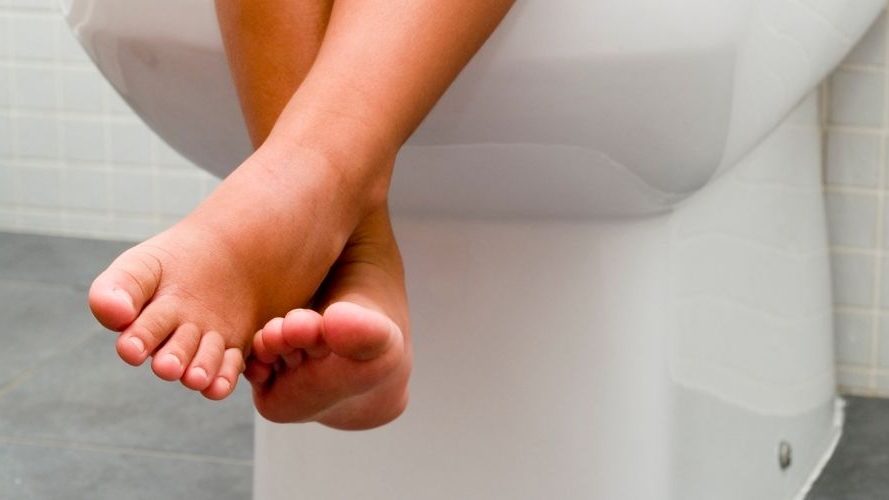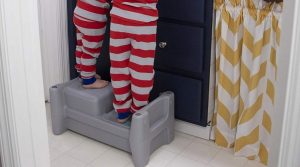One minute you’re an actual person with hobbies, interests, and real-life friends, and the next thing you know, you’re Googling “Why won’t my toddler poop?” We’ve been there, and we’re here to help.
Peeing often comes fairly easily when potty training, while pooping on the potty is a whole different story that can require a lot of patience and positivity. Or maybe your child regressed after a painful experience that led them to hold their poop out of fear.
Here are the reasons why poop withholding often happens and what you can do about it.
How often should my toddler be pooping?
Generally speaking, toddlers should be pooping once a day and at least three times a week. If your child is pooping less than three times a week or their poop is large, dry, hard, and/or painful, then they are considered constipated.1Toddler Constipation
www.webmd.com The consistency of the poop is more important than how often they go. While occasional constipation is nothing to worry about, chronic constipation should be treated.
Can poop withholding become a problem?
Poop withholding can cause constipation, painful bowel movements, stomach pain, and stool leakage. The problem is then compounded when children are scared to poop because it hurts. Constipation can cause pressing on the bladder, resulting in accidents, bedwetting, and UTIs.
Why do toddlers hold their poop?
Toddlers withholding their poop is a common problem, even more commonly seen in boys.2What Should You Do When Your Kid Refuses to Poop?
health.clevelandclinic.org It occurs frequently in children who are potty training, many of whom wait until they are wearing a diaper to poop instead of using the toilet.3Is Your Toddler Straight-Up Refusing to Poop in the Toilet? Join the Club.
slate.comHere are other reasons your toddler may not want to go.
A painful experience
Most often, toddlers have a painful experience due to constipation or large stool and begin to hold their poop for fear that it will happen again. As you can imagine, this does not help them out in the long run only increasing the chances that when they do poop, it will be painful. When poop sits in the rectum instead of being released, it becomes harder, larger, and more difficult to pass. This can cause fissures, tearing, or bleeding, causing more pain and fear.4Toddler Withholding Bowel Movements May Need Reassurance
newsnetwork.mayoclinic.org
They may not be ready
If pain and constipation aren’t the cause, consider if you may be potty training your toddler before they’re ready. Watch your child for readiness cues, let them lead the process, and don’t give in to pressure to potty train once they reach a certain age. It’s also common for children to pick up peeing on the potty very quickly but still be intimidated by the idea of pooping on the potty.
Busy, anxious, or sensitive toddlers
Other children may be too “busy” to take a break to poop. Sitting on the toilet is definitely less fun than playing. If your child has anxiety or sensory issues, they may not like the feeling of going poop. For these children, it can be a stressful experience, particularly if they are bothered by the look and smell of poop.
Diet
Changes in diet, such as switching your toddler from breast milk to whole milk, can cause constipation. A diet that’s high in carbs, dairy, and fat, and low in fiber and liquids can also be the culprit. Toddlers are notoriously picky and getting them to eat leafy greens and whole grains can be next to impossible.
What can I do?
Hard as it may be, patience and praise go a long way. If your toddler has recurring constipation, it’s not something that’s going to be fixed overnight. And if you stress, so will they.
Keep it positive
Encourage them to use the bathroom regularly, using a small potty or a stool underneath their feet. Have them try to go 30-60 minutes after meals, waiting for 10 minutes (or as close to it as you can get). If they refuse, don’t make it a power struggle. Talk and read about pooping on the potty, and use a lot of positive reinforcement each time they use the toilet. Some parents have luck with sticker charts or a small treat after pooping on the potty.
Check their readiness
If you’re still at the beginning of the potty training process, take a second to evaluate if they are truly ready for potty training. Not just are they at the “right” age but are they truly ready. If they’re happily peeing in the potty, then keep that up, and consider letting them poop in a diaper. As with many things in parenting, sometimes making things a big deal backfires.
Instead, give them diaper time in the bathroom until they are comfortable using the toilet. While it may seem like a regression, it’s preferable to pain and constipation, and they will poop on the potty eventually. I used this method for my children, and they all grasped the concept in their own time- and it really didn’t take that long.
Healthy diet, movement, and hydration
Taking a warm bath helps some children relieve constipation. It’s also crucial to take a look at food intake and movement. Unfortunately, the typical toddler’s diet lends itself to constipation. What do toddlers love? Dairy and carbs. What backs you up? Dairy and carbs.
Hard as it may be to get them to actually eat it, offer whole grains, fruits (except bananas), and vegetables, particularly beans, broccoli, pears, and apples. Drinking a lot of water is important, but again- not all toddlers will do so. Offer diluted juice if necessary, just get them drinking. Your toddler may resist diet changes, and it may not be enough to soften their stool significantly, but it’s certainly worth trying before medication and supplements.
Healthy movement is also important for digestive issues. Get outside, go for a walk, to the playground, or put on a YouTube yoga video. To get things moving, sometimes you have to get moving.
When to see your pediatrician
If your child has been struggling with constipation and poop withholding for a couple of months, or they’re struggling with eating, vomiting, or weight gain, see your doctor. You should always consult your pediatrician before using stool softeners, fiber supplements, or laxatives. There are rare medical conditions that can cause toddlers to stop pooping, such as fecal impaction, gastrointestinal conditions, celiac disease, and colonic inertia.
Wrapping up
Poop withholding is an issue that can quickly become stressful because, well, kids need to poop! Holding it in can cause a vicious cycle- they’re withholding because it hurts, and it hurts because they’re withholding. Luckily, for most toddlers, this is a short phase that can be remedied by letting them use a diaper or making a few changes to prevent constipation. When in doubt, check with your pediatrician to make sure there aren’t any underlying health issues.








